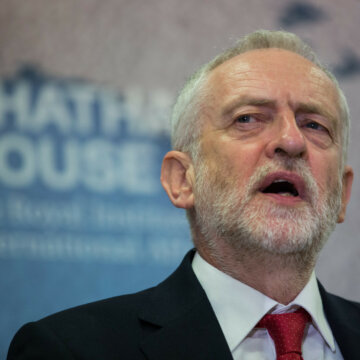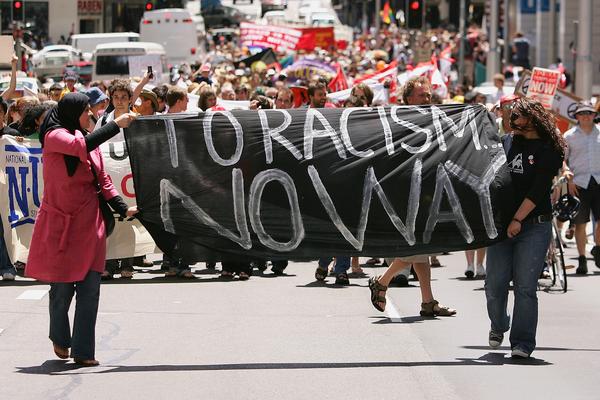- About
- Topics
- Picks
- Audio
- Story
- In-Depth
- Opinion
- News
- Donate
- Signup for our newsletterOur Editors' Best Picks.Send
Read, Debate: Engage.
| topic: | Anti-Semitism |
|---|---|
| located: | United Kingdom |
| editor: | Gurmeet Singh |
The Parliamentary Labour Party is still in turmoil and doesn’t look like it will be a unified and effective opposition any time soon.
The background: Jeremy Corbyn, former leader of the party was accused of holding anti-Semitic views, and of allowing anti-Semitism to flourish in the party during his time as leader. An EHRC report into the matter described a party riven with serious internal disputes, and also several examples of discrimination and harassment. The report did not name Corbyn at fault personally but criticised an absence of leadership which allowed these events to occur. Current leader Keir Starmer suspended Corbyn from the party as a result.
Writing in The Guardian, Keith Kahn-Harris comments:
“Even before Starmer’s move to suspend Corbyn, it was already obvious that the EHRC findings were not going to be the last word on this subject. Those who defend the legacy of the Corbyn years will seize upon the lack of direct condemnation of Corbyn himself, and the fact that only two individuals (one of them Ken Livingstone, who left the party under threat of expulsion) are directly accused of unlawful harassment. That means that defenders of Corbyn can argue that Starmer’s decision was an overreaction.
Conversely, among those who opposed Corbyn, the finding that the party has acted unlawfully is likely to be mischaracterised by some as a top-to-bottom condemnation. There will be others who are disappointed that the party was not found to be “institutionally racist” – and that there was no demand for action against Corbyn.”
He also reminds us that: “The fact that a party that regards anti-racism as central to its self-definition – particularly during the Corbyn years – has been investigated for racism is shocking in and of itself.”
But writing in the same paper just days before, Karie Murphy, Corbyn’s former Chief of Staff, claimed: “Dealing with the EHRC, and getting input into the investigation process, has not always been easy. So, as someone who was at the centre of dealing with these issues, in parliament and at Labour HQ, I want to set the record straight. Under Jeremy Corbyn’s leadership, antisemites were removed from the Labour party more quickly, transparently and effectively than ever before.”
So where does the party go from here? The crisis in the party is clearly factional, and sides will claim victory or validation either way: pro-Corbyn supporters will say the media and party insiders exaggerated the extent of anti-Semitism within the party, and tried to smear Corbyn for the sake of bringing him and his agenda down. Anti-Corbyn supporters will say the report justifies his suspension, and that the party needs to unite under Starmer.
I personally believe that nearly all the claims are true and not mutually exclusive: I do not believe that Corbyn is prejudiced, but that his poor leadership and negligence allowed prejudice to thrive in the party. Obviously, the two go hand-in-hand. I also believe that the extent of his personal involvement in discriminatory behaviour, as well as the claims made by the media about the party’s dysfunctionality, were exaggerated; however, the EHRC report does highlight the need for serious action in the party, especially if it is to live up to its principles.
If the party wants to avoid further chaos and act as a substantial opposition to the incumbent Conservative Party, it will have to take the findings of the report seriously, and also, continue to root out anti-Semitic, racist and other prejudiced views from its ranks. However, Corbyn’s suspension threatens to turn this into just another part of the factional dispute within the party. Kahn-Harris concludes his article on two points: that the report both needs to be implemented, but also more needs to be done.
He writes: “My fear is that the task will be ignored and marginalised in the months ahead amid the reverberations of Starmer’s decision to suspend Corbyn. Whether or not it was justified – and, at the very least, Corbyn was the man leading the party when the events condemned by the EHRC took place – it is likely that wider consideration of antisemitism and abuse will be obstructed by endless trench warfare among those who wish to relitigate the past forever.
The best way to prevent that happening is to do what the EHRC report could not do – highlight the voices and experiences of those who have been hurt by antisemitism in Labour. Ultimately, behind the dense legal material, there is a human story – a story of people who have been threatened and harassed inside a party outwardly dedicated to ensuring that no one should have such experiences.”
Image by Chatham House

